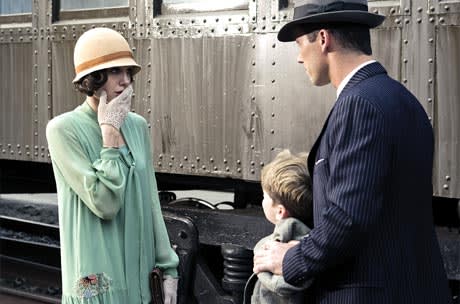Clint Eastwood continues his improbable late career renaissance as a director with one of two autumn entries (Gran Torino will drop before years end), telling the true story of Christine Collins (Angelina Jolie), whose sons kidnapping in 1928 Los Angeles became a flashpoint for a police corruption scandal.
The film opens like an homage to "womens pictures; Collins is a plucky single mom trying to juggle work as a phone operator with raising her sweet young boy. When he disappears from their home, she raises holy hell with local police but to no avail; theyre busy fending off charges of corruption from outraged citizens under siege from their "shoot first, ask no questions later approach to law enforcement.
When, seeking a PR "win, police return a young boy to Collins five months later, the last thing they want to hear is "thats not my son. (Evidence includes the fact that this boy is three inches shorter, and circumcised.) While Collins initially agrees to keep quiet about it, she realizes that the investigation to find her son disappears when the case is "solved, so she puts her plucky shoulder up against this police stonewalling and shoves as hard as she can. Shes declared "hysterical and institutionalized until her case catches the attention of Reverend Gustav Briegleb (John Malkovich), who takes up the cause.
At this point, the film starts to take on all comers, narratively, adding a related murder mystery and the socio-political allegories to Collins specific story while the running time bloats to near the two-and-a-half-hour mark.
The script, by J. Michael Straczynski (Babylon 5), is partly to blame, while director Eastwood follows each tangent to its conclusion with his steady hand. He could have taken his hand off the soundtrack his jazz-lite score is one of the films few weak links but its hard to fault him wanting to get as much narrative detail on screen as possible, for the sake of truth.
After all, this isnt a "based on a true story picture; for all its shocking revelations, its as close to fact as a film can be, 80 years after the fact. Jolie banishes all fears of seeming anachronistic with a powerful, subdued performance; its one of her best, and it anchors the film in a heartbreaking reality thats sure to be one of the critical successes of the year.
(Universal)The film opens like an homage to "womens pictures; Collins is a plucky single mom trying to juggle work as a phone operator with raising her sweet young boy. When he disappears from their home, she raises holy hell with local police but to no avail; theyre busy fending off charges of corruption from outraged citizens under siege from their "shoot first, ask no questions later approach to law enforcement.
When, seeking a PR "win, police return a young boy to Collins five months later, the last thing they want to hear is "thats not my son. (Evidence includes the fact that this boy is three inches shorter, and circumcised.) While Collins initially agrees to keep quiet about it, she realizes that the investigation to find her son disappears when the case is "solved, so she puts her plucky shoulder up against this police stonewalling and shoves as hard as she can. Shes declared "hysterical and institutionalized until her case catches the attention of Reverend Gustav Briegleb (John Malkovich), who takes up the cause.
At this point, the film starts to take on all comers, narratively, adding a related murder mystery and the socio-political allegories to Collins specific story while the running time bloats to near the two-and-a-half-hour mark.
The script, by J. Michael Straczynski (Babylon 5), is partly to blame, while director Eastwood follows each tangent to its conclusion with his steady hand. He could have taken his hand off the soundtrack his jazz-lite score is one of the films few weak links but its hard to fault him wanting to get as much narrative detail on screen as possible, for the sake of truth.
After all, this isnt a "based on a true story picture; for all its shocking revelations, its as close to fact as a film can be, 80 years after the fact. Jolie banishes all fears of seeming anachronistic with a powerful, subdued performance; its one of her best, and it anchors the film in a heartbreaking reality thats sure to be one of the critical successes of the year.
